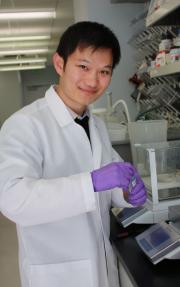
Ka Wing Cheng, Ph.D.
Post Doctoral Associate
e-mail: Ka-Wing.Cheng@stonybrookmedicine.edu
Dr. Cheng received his Ph.D. from the University of Hong Kong, Hong Kong. His PhD study was centered on evaluating the preventive potential and mechanism of dietary polyphenols on the formation of mutagenic heterocyclic amines. Currently, he is mainly investigating the efficacy of novel drug derivatives in the prevention and/or treatment of colon and lung cancers.
Publications:
1. Cheng KW, Zeng X, Tang YS, Wu JJ, Sze KH, Chen F, Wang M.* Inhibitory mechanism of naringenin against acrylamide formation and non-enzymatic browning in Maillard model reactions. Chemical Research in Toxicology, 2009, 22, 1483-1489. To view pdf click here
2. Cheng KW, Wong CC, Wang M, He QY, Chen F.
Identification and characterization of molecular targets of natural products by
mass spectrometry. Mass Spectrometry Reviews, 2010, 29, 126-155.
To view pdf click here
3. Cheng KW, Shi JJ, Ou SY, Wang M, Jiang Y. Effects of fruit extracts on the formation of acrylamide in model reactions and fried potato crisps. Journal of Agricultural and Food Chemistry, 2010, 58, 309-312.
4. Cheng KW, Chao J, Lo C, Chen F, Chu IK, Che C, Ho CT, Wang M. Inhibition of mutagenic PhIP formation by EGCG via scavenging of phenylacetaldehyde. Molecular Nutrition and Food Research, 2009, 53, 716-725.
5. Cheng KW, Wu QL, Zheng ZP, Peng
XF, Simon JE, Chen F, Wang M. Inhibitory
effect of fruit extracts on the formation of heterocyclic amines. Journal of Agricultural and Food Chemistry,
2007, 55, 10359-10365.
To view pdf click here
6. Cheng KW, Chen F, Wang M. Inhibitory activities of dietary
phenolic compounds on heterocyclic amine formation in both chemical model
system and beef patties. Molecular
Nutrition and Food Research, 2007, 51, 969-976.
To view pdf click here
7. Cheng KW, Yang RY, Tsou SCS, Lo C, Lee TC, Wang M. Analysis of different types of antioxidants in Chinese toon (Toona sinensis), a Chinese vegetable, Journal of Functional Food, 2009, 1 253-259.
8. Cheng KW, Chen F, Wang MF. Heterocyclic amines: chemistry and health. Molecular Nutrition and Food Research, 2006, 50, 1150-1170. To view pdf click here
9. Cheng KW, Cho CK, Chu IK, Sze KH, Lo C, Chen F, Wang M. Trapping of phenylacetaldehyde as a key mechanism responsible for naringenin’s inhibitory activity in mutageninc PhIP formation. Chemical Research in Toxicology, 2008, 21, 2026-2034.
10. Cheng KW, Wang M, Chen F, Ho CT. Oligostilbenes from Gnetum species and anticarcinogenic and anti-inflammatory activities of oligostilbenes. ACS Symposium Series Dietary Supplements. Edited by CT, Ho, JE, Simon, FS, Shahidi, Y, Shao, 2008, 987, p. 36-58.
11. Cheng KW, Chen F, Wang M. Liquid chromatography-mass spectrometry in natural product research. In: Bioactive natural products: detection, isolation and structural determination, 2nd, edited by SM. Colegate and RJ. Molyneux, published by Taylor & Francis, 2007, p. 245-261.
12. Chao J, Li H, Cheng KW, Yu MS, Chang RCC, Wang M. Protective effects of pinostilbene, a resveratrol methylated derivative against 6-hydroxydopamine-induced neurotoxcity in SH-SY5Y cells. Journal of Nutritional Biochemistry, 2010, 21, 482-489. To view pdf click here
13. Zeng X, Kong R, Cheng KW, Du Y, Tang YS, Chu IK, Lo C, Sze KH, Chen F, Wang M. Direct trapping of acrylamide as a key mechanim for niacin‘s inhibitory activity in carcinogenic acrylamide formation. Chemical Research in Toxicology, 2010, 23, 802-807. To view pdf click here
14. Zhu Q, Zheng ZP, Cheng KW, Wu JJ, Tang YS, Sze KH, Chen F, Wang* M. Natural Polyphenols as Direct Trapping Agents of Lipid Peroxidation-derived Acrolein and 4-Hydroxy-trans-2-nonenal. Chemical Research in Toxicology, 2009, 22, 1721-1727. To view pdf click here